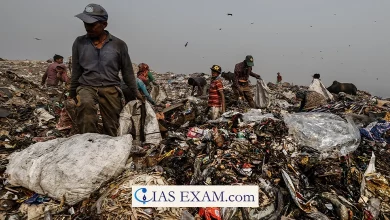Daily Current Affairs for UPSC
Group of Four (G-4) Countries
Topic- Important International Institutions [GS Paper-2]
Context- On the sidelines of the 76th session of the UN General Assembly, the G-4 countries stressed on ‘urgent need’ for reform in the U.N. Security Council (UNSC).
Key Highlights
- It was felt necessary that the UN decision-making bodies need to be urgently reformed as global issues are increasingly complex and interconnected.
- Further, the G4 countries recapitulated their joint commitment to work toward text-based negotiations that lead to Reformed Multilateralism.
- The countries also highlighted that the General Assembly did not make any meaningful progress in the Intergovernmental Negotiations (IGN) and lacked transparency.
- They stressed on their support for African countries being represented in a permanent and non-permanent capacity.
- The Ministers agreed on the need for an intense role and presence of developing countries and of major contributors to the United Nations to amplify the capacity of the Council to respond effectively to the complex and evolving challenges on questions of international peace and security.
Group of Four(G-4) Nations
- The G4 is a grouping of Brazil, Germany, India and Japan in order to support each other to become permanent members of the United Nations Security Council.
- The United Nations has five permanent members with veto power in the Security Council i.e. China, France, Russia, the United Kingdom, and the United States.
- Whereas the G4 countries are regularly elected for two-year terms to the Security Council as non-permanent members by their respective regional groups and in the 24-year period from 1987 to 2010, Brazil and Japan were elected for five terms each, Germany for four terms and India for four terms.
- The G4 nations traditionally meet on the sidelines of the annual high-level UN General Assembly session stressing on the need for including them as permanent members.
Need for Reforms in the UNSC
- The UN represents a larger world but it has only 5 permanent members in its important body.
- The current composition of the Security Council constitutes the post-World War II realities and thus it is not in pace with the current changing balance of power in the world.
- At the time of the formation of the UNSC, big powers were given certain advantages to become a part of the council. It was necessary at that time for its proper functioning as well as to avoid failure of the League of Nations.
- The regions like far East Asia, South America, and Africa do not have representation in the permanent membership of the council.
India’s demand for Permanent Membership of the UNSC
- For the first 40 years since the UN Security Council was formed, India never asked for permanent membership.
- Even in 1993 when India submitted its written proposal to the UN in response to the General Assembly resolution related to reforms, it did not specifically state if it wanted permanent membership for itself.
- But from the last few years, India has started demanding for permanent membership in the security council.
- Also in many terms India deserves a permanent place in the council considering the size of its economy, population and the fact that it is the largest democracy in the world.
- India has turned into a major player not only in Asia but also in the world.
- The Security Council can be a more representative body if India would become a permanent member.
Need for India
- With veto power, permanent members enjoy enormous powers. For instance since 2009, India was trying to designate Masood Azhar as a global terrorist. One veto power of China kept delaying it.
- Hence if India becomes a permanent member of UNSC then it will be able to work better for its interests.
- India’s presence as a permanent member will act as a boost towards its rise as a global power, ready to perform a key role in the council’s objectives of international peace and security.
- Also it will enable India to enjoy the ‘prestige’ associated with the permanent membership of the council.
United Nations Security Council (UNSC)
- The UN Security Council was established by the United Nations charter in 1945, with the primary responsibility of maintaining international peace and security.
- The Security Council consists of 15 members among which there are five permanent members i.e. the United States, the Russian Federation, France, China and the United Kingdom. These members have veto power in the council.
- The non-permanent members of the Security Council are elected by the United Nations General Assembly for a term of two years.
- Each member of the Security Council owns one vote. Decisions of the Security Council on matters are made by an affirmative vote of nine members including the concurring votes of the permanent members. But it needs all the permanent members to agree on the resolution in order to pass it.
- Any member of the United Nations which is not a member of the Security Council can participate, without vote, in the discussion of any question brought before the Security Council whenever the latter considers that the interests of that member are specially affected.
Way Forward
- Global power pecking orders are changing and the P5 i.e the permanent members needs to realize that this is high time to initiate UNSC reforms.
- The declining powers should either give away their membership or should expand the size of the UNSC, opening the doors for new emerging global powers.
- Other reforms might succeed earlier than the expansion of P5 as none of the powerful nations wants to expand the table and share their pie with another nation.
- In the case of India it needs to focus on strengthening itself economically, militarily & diplomatically in order to participate in major conversations and groupings so that the UNSC will itself deem India fit to become a part of the UNSC





.png)



